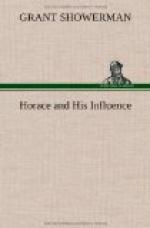Finally, in the year 527, the consul Vettius Agorius Basilius Mavortius, with the collaboration of one Felix, revised the text of at least the Odes and Epodes, and perhaps also of the Satires and Epistles. That there were many other editions intervening between Porphyrio’s and his, there can be little doubt.
This review of scant and scattered, but consistent, evidence is proof enough of Horace’s hold upon the intellectual and literary leaders of the ancient Roman world. For the individual pagan who clung to the old order, he represented more acceptably than anyone else, or anyone else but Virgil, the ideal of a glorious past, and afforded consequently something of inspiration for the decaying present. Upon men who, whether pagan or Christian, were possessed by literary enthusiasms, and upon men who delighted in contemplation of the human kind, he cast the spell of art and humanity. Those who caught the fire directly may indeed have been few, but they were men of parts whose fire was communicated.
As for the influence exercised by Horace upon Roman society at large through generation after generation of schoolboys as the centuries passed, its depth and breadth cannot be measured. It may be partly appreciated, however, by those who realize from their own experience both as pupils and teachers the effect upon growing and impressionable minds of a literature rich in morality and patriotism, and who reflect upon the greater amplitude of literary instruction among the ancients, by whom a Homer, a Virgil, or a Horace was made the vehicle of discipline so broad and varied as to be an education in itself.
3. HORACE AND THE MIDDLE AGE




